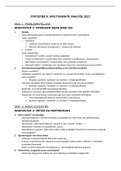Samenvatting
PYC2603 SUMMARY 2021/1
- Vak
- Instelling
- Boek
A comprehensive old-school summary of prescribed work as highlighted in the Study Guide for this module. Includes a full list of all definitions.
[Meer zien]Voorbeeld 4 van de 63 pagina's
Voorbeeld 4 van de 63 pagina's
Enkele voorbeelden uit deze set oefenvragen
1.
Define ACCOMMODATION in identity formation.
Antwoord: The process of changing one’s identity in response to experiences.
2.
Define ADAPTATION.
Antwoord: The process of adjusting one\'s thinking to the environment.
3.
Define AGEISM.
Antwoord: Discrimination based on chronological age.
4.
Define AGELESS SELF.
Antwoord: The experience that the self (core of one’s personality) remains the same, regardless of biological and chronological ageing.
5.
Define ANALYTIC INTELLIGENCE.
Antwoord: The ability to analyse, compare and evaluate.
6.
Define ARTERIOSCLEROSIS.
Antwoord: The thickening and hardening of the walls of the arteries, occurring typically in old age.
7.
Define ASSIMILATION in identity formation.
Antwoord: The attempt / tendency to interpret new experiences ito an existing identity.
8.
Define ATROHPY.
Antwoord: Deterioration, wasting away or diminution of tissue cells.
9.
Define ATTACHMENT.
Antwoord: Strong affectional ties that bind people together.
10.
Define BALANCE in identity formation.
Antwoord: The integration of age-related changes into one’s identity; maintaining a balance between identity assimilation & identity accommodation (positive view of the self).

Studenten hebben al meer dan 850.000 samenvattingen beoordeeld. Zo weet jij zeker dat je de beste keuze maakt!

Geen gedoe — betaal gewoon eenmalig met iDeal, creditcard of je Stuvia-tegoed en je bent klaar. Geen abonnement nodig.

Studenten maken samenvattingen voor studenten. Dat betekent: actuele inhoud waar jij écht wat aan hebt. Geen overbodige details!
Je krijgt een PDF, die direct beschikbaar is na je aankoop. Het gekochte document is altijd, overal en oneindig toegankelijk via je profiel.
Onze tevredenheidsgarantie zorgt ervoor dat je altijd een studiedocument vindt dat goed bij je past. Je vult een formulier in en onze klantenservice regelt de rest.
Stuvia is een marktplaats, je koop dit document dus niet van ons, maar van verkoper lizelsmith. Stuvia faciliteert de betaling aan de verkoper.
Nee, je koopt alleen deze samenvatting voor $4.44. Je zit daarna nergens aan vast.
4,6 sterren op Google & Trustpilot (+1000 reviews)
Afgelopen 30 dagen zijn er 65040 samenvattingen verkocht
Opgericht in 2010, al 15 jaar dé plek om samenvattingen te kopen
